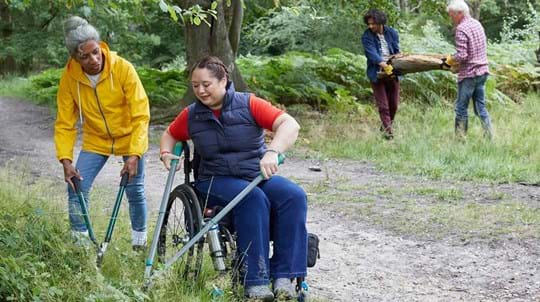
About us
Our commitment to diversity and inclusion
We believe everyone, no matter who they are or where they live, deserves to benefit from woods and trees.
The Woodland Trust is committed to be, at all times, and across all its activities, a sustainable, diverse and inclusive organisation, driven by ethical values and principles. This policy details those ethical principles as well as our commitments to embed these principles across our activities. It influences many other policies governing how we work and it is supported by tools to assist decision making where there are conflicting demands.
This policy is endorsed by the Executive Leadership Team and the Board of Trustees - responsibility for its implementation lies with the Chief Executive.
The Woodland Trust exists to realise all the environmental, social and economic benefits that woods and trees bring to society. Our vision is for a world where native woods and trees thrive for people and nature. We will:
This policy covers the ethical standards we set and uphold for ourselves and for others. In delivery of our policy commitments, we will be pragmatic and realistic: our ethical values are firmly rooted in the real world, recognising that in some cases there will be conflicting demands or dilemmas, and a need to balance many differing aspects (for example, financial, ethical, environmental and reputational).
We expect organisations that we invest in, that supply us, or who partner with us to:
The standards we set ourselves are at least as high, and usually higher, than the standards we expect of others. In our engagement with third parties we will seek to strike a balance between negative and positive actions: in some cases our response to an ethical issue will be “negative” i.e. we will not work with/buy from/invest in an organisation. In other cases we may determine that we can exert a “positive” influence on such an organisation, therefore we may work with them in order to seek to influence a change in behaviour or policy on a specific area. This will only be where it can be clearly demonstrated that there is genuine senior leadership commitment.
We will:
The following issues of ethical concern for the Woodland Trust will be considered in our ethical appraisal of our own activities and of those who we engage with:
Criteria A: linked directly to our charitable objectives
Criteria B: not linked directly to our charitable objectives
Board approved: December 2024

About us
We believe everyone, no matter who they are or where they live, deserves to benefit from woods and trees.

About us
We report on our gender pay gap in accordance with government guidelines.

Privacy policy
Find out how we respect the privacy of our supporters and visitors to our websites.

About us
We're committed to ensuring that modern slavery and human trafficking don't exist anywhere in our organisation, corporate activities or supply chain.

About us
This policy details our zero-tolerance approach to bribery and corruption, ensuring we operate professionally, fairly and with integrity at all times.